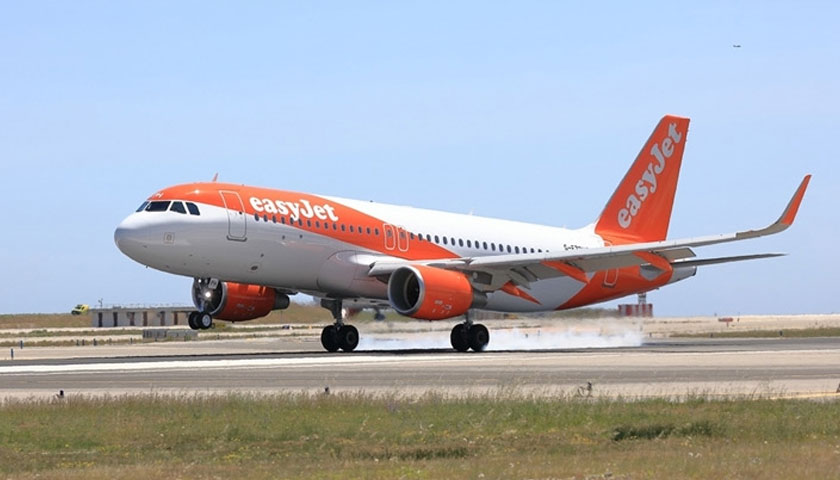easyJet has announced a multi-million-pound fleet-wide investment into the latest aircraft software which will help the airline to achieve substantial and permanent carbon emission reductions in the short-term by enabling the optimisation of aircraft descents.
The fleet-wide introduction of Descent Profile Optimisation (DPO) alongside the Continuous Descent Approach (CDA) on all compatible aircraft will deliver fuel and therefore carbon reductions, as well as noise reductions for aircraft also equipped with CDA. By this time next year, once the retrofit is completed, easyJet will have the largest fleet of DPO and CDA enabled aircraft in the world leading to an estimated annual carbon emission reduction of 88,600 CO2 MT – which is equivalent to driving an average car 16,173 times around the earth.
Descent Profile Optimisation (DPO) is a fuel saving initiative which updates the Flight Management System (FMS) to enable consistently more efficient descents by allowing the aircraft to remain in the cruise phase longer and reduce deceleration level-off, which reduces carbon emissions. CDA also minimises noise pollution on the approach, which particularly benefits communities around airports.
This announcement comes as easyJet is launching its roadmap to net-zero carbon emissions by 2050. While the airline’s ultimate ambition is to transition to zero carbon emission technology, reducing carbon emissions in the short-term is crucial to address the airline’s carbon impact right now and to achieve easyJet’s science-based target of a 35% carbon emissions intensity improvement by FY35 on a FY19 baseline.
In the short-term, continuous improvements every single day help to reduce airline carbon emissions. Since 2000 easyJet has already reduced its carbon emissions per passenger, per kilometre by one-third through a combination of fleet renewal and efficient operations. In the coming years, easyJet will continue to invest in fleet renewal, making a list price investment of $21bn in new Airbus A320neo family aircraft which are 15% more fuel efficient and 50% quieter than the aircraft they will replace.
Today’s announcement to further increase the efficiency of easyJet’s operations by updating the technology across its fleet comes in addition to a whole range of initiatives the airline is already undertaking to reduce carbon emissions.
This includes adjusting standard operating procedures to enable single-engine taxiing on arrival and departure, reducing usage of Auxiliary Power Units on its aircraft, using advanced weather information to improve navigational performance or engine washing to remove debris, which improves the air turbine performance.
The airline is also implementing new software and AI to identify further operational efficiencies. easyJet is adopting SkyBreathe®, an innovative efficiency solution developed by OpenAirlines, which is based on Cloud, Artificial Intelligence and Big Data and enables airlines to save fuel and reduce their carbon footprint by up to 5%.
This is complemented by flight efficiency partnerships with key stakeholders such as Airbus, Collins Aerospace, NATS and Eurocontrol. easyJet has this year received the first A320neo from Airbus that is equipped with the latest Satellite Landing System (SLS) technology which helps to further improve the efficiency of its operations, reducing fuel usage. In addition, the airline is working closely with its pilots to gather and implement suggestions on how further carbon savings can be achieved.
A crucial element to achieving carbon emission reductions right now is airspace modernisation. This cannot be achieved by the industry alone but only with the help and the political will of governments and stakeholders. This is vital for the entire industry and, if implemented, would be the most significant source of carbon reductions right now as more direct flight paths lead to shorter flying times, which reduce fuel burn and resulting emissions.
easyJet is working with stakeholders and public authorities across Europe to advocate for the modernisation of airspace, including projects such as the Single European Sky and the UK’s airspace modernisation programme. For example, the Single European Sky has stated an ambition to deliver 10% carbon emissions savings from European aviation.
easyJet is one of founding members of the Single European Sky ATM Research (SESAR) 3 Joint Undertaking, an institutionalised European public-private partnership, to accelerate the delivery of the Digital European Sky.
The airline has also recently become the first airline evaluation partner for IRIS, a ground-breaking air traffic management programme, led by global satellite communications leader Inmarsat, together with the European Space Agency and Airbus, that is paving the way for more efficient air traffic management by acting as an enabling to systems that minimise flight delays, save fuel and help reduce the environmental impact of air travel.
Captain David Morgan, easyJet’s interim COO, said:
“While our ultimate ambition is to achieve zero carbon emission flying, we must continue our focus on reducing the carbon emissions in our operation each and every day. That’s why this multi-million-pound investment is an important step in achieving a permanent reduction in the short-term which will see us operating the largest fleet of DPO & CDA enabled aircraft in the world.
“But one crucial element to reduce carbon emissions right now cannot be achieved by the industry alone, and so we are also calling on governments to introduce airspace modernisation right now, including finally implementing the Single European Sky.”
Wouter Van Wersch, Airbus’ Executive Vice President, Region and Sales Europe, said:
“We are very pleased that easyJet will equip its entire Airbus A320-family-fleet with these state-of-the-art technologies. Emission reduction in aviation is most successfully achieved as a team effort – aircraft manufacturers joining forces with airlines and air traffic management. By combining the use of DPO and CDA, easyJet will further reduce its fuel consumption while optimising the trajectory of all its flights.”

